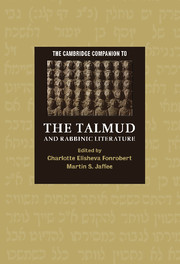Book contents
- Frontmatter
- Introduction: The Talmud, Rabbinic Literature, and Jewish Culture
- Part I: The Conditions of Rabbinic Literary Activity
- Part II: The Genres of Rabbinic Literary Composition
- 5 Rabbinic Midrash and Ancient Jewish Biblical Interpretation
- 6 The Judaean Legal Tradition and the Halakhah of the Mishnah
- 7 Roman Law and Rabbinic Legal Composition
- 8 Middle Persian Culture and Babylonian Sages: Accommodation and Resistance in the Shaping of Rabbinic Legal Tradition
- 9 Jewish Visionary Tradition in Rabbinic Literature
- 10 An Almost Invisible Presence: Multilingual Puns in Rabbinic Literature
- Part III: Hermeneutical Frames for Interpreting Rabbinic Literature
- Bibliography
- Index
- Source Index
- Series List
9 - Jewish Visionary Tradition in Rabbinic Literature
from Part II: - The Genres of Rabbinic Literary Composition
Published online by Cambridge University Press: 28 November 2007
- Frontmatter
- Introduction: The Talmud, Rabbinic Literature, and Jewish Culture
- Part I: The Conditions of Rabbinic Literary Activity
- Part II: The Genres of Rabbinic Literary Composition
- 5 Rabbinic Midrash and Ancient Jewish Biblical Interpretation
- 6 The Judaean Legal Tradition and the Halakhah of the Mishnah
- 7 Roman Law and Rabbinic Legal Composition
- 8 Middle Persian Culture and Babylonian Sages: Accommodation and Resistance in the Shaping of Rabbinic Legal Tradition
- 9 Jewish Visionary Tradition in Rabbinic Literature
- 10 An Almost Invisible Presence: Multilingual Puns in Rabbinic Literature
- Part III: Hermeneutical Frames for Interpreting Rabbinic Literature
- Bibliography
- Index
- Source Index
- Series List
Summary
Judaism in Late Antiquity encompassed a wide variety of ritual forms and ideological expressions rooted in the diversity of particular Jewish communities. Such eclecticism characterizes even apparently unified movements such as that of the rabbinic sages. Although we tend to associate rabbinic Judaism with the scholastic emphasis on the study of Torah and the observance of halakhah, there are distinct streams of Judaism in the rabbinic milieu that concentrate on visions of and communications with God and the heavenly retinue. Judaism, like other religions of the Greco-Roman world, encompassed within it not only legal, philosophical, and ritual traditions but also esoteric tendencies in which magical and visionary practices were put to use for the needs of individuals. Among the most unusual of these are the traditions in which human beings are said to travel to heaven and gaze at the figure of God on the divine throne or encounter angels and other supernatural beings, who endow them with extraordinary wisdom and memory. Evidence for these ideas can be found within the rabbinic canon and in a corpus of texts related in complex ways to the Talmuds and midrashim. This chapter will assess the evidence for visionary and mystical phenomena in rabbinic culture with an eye to understanding them in the context of the development of rabbinic Judaism, as well as the broader Greco-Roman religious environment.
- Type
- Chapter
- Information
- The Cambridge Companion to the Talmud and Rabbinic Literature , pp. 198 - 221Publisher: Cambridge University PressPrint publication year: 2007
- 1
- Cited by



